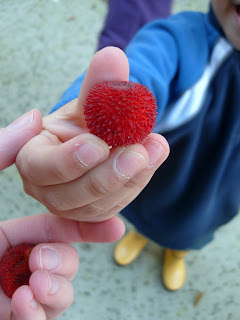With our next baby due in September, we started school early this year to get a term in before her arrival. I don't mind at all--I plan to school pretty much year-round to give us 4-day weeks and flexible off-days through the year. That means we finished up our kindergarten year and moved pretty much straight into our first-grade studies. That isn't saying all that much, as our schooling last year was very casual, and Year 1 continues to be fairly light as well. Before moving onto our first grade plans, though, I wanted to hit some of the high points of what was truly a lovely kindergarten year with my two oldest.
I'm going to break our studies into a few categories to give me a chance to chat a bit about each: the Morning Basket, nature study, arts and handicrafts, math, and free reading.
First, though, I wanted to mention a passage from Charlotte Mason's writings that really guided my own thoughts on how kindergarten should look. Charlotte Mason advocated delaying any significant formal academics until at least age six. Before that, though, there is certainly time for learning and even some structured "lessons," provided that they are gentle, joyous, and do not encroach on the child's freedom to be a child. To make sure this atmosphere is cultivated, she lays out in her first volume "four tests":
"Four Tests which should be applied to Children's Lessons.––We see, then, that the children's lessons should provide material for their mental growth, should exercise the several powers of their minds, should furnish them with fruitful ideas, and should afford them knowledge, really valuable for its own sake, accurate, and interesting, of the kind that the child may recall as a man with profit and pleasure."
I just love how she asserts here that even the youngest children should be exposed to real ideas. Valuable, profitable, fruitful, true ideas. Her respect for the mind of the child is so evident.
She then goes on to remind her readers of six important points in the "schooling" of children of preschool and kindergarten age:
"(a) That the knowledge most valuable to the child is that which he gets with his own eyes and ears and fingers (under direction) in the open air.
(b) That the claims of the schoolroom should not be allowed to encroach on the child's right to long hours daily for exercise and investigation.
(c) That the child should be taken daily, if possible, to scenes––moor or meadow, park, common, or shore––where he may find new things to examine, and so add to his store of real knowledge. That the child's observation should be directed to flower or boulder, bird or tree; that, in fact, he should be employed in gathering the common information which is the basis of scientific knowledge.
(d) That play, vigorous healthful play, is, in its turn, fully as important as lessons, as regards both bodily health and brain-power.
(e) That the child, though under supervision, should be left much to himself––both that he may go to work in his own way on the ideas that he receives, and also that he may be the more open to natural influences.
(f) That the happiness of the child is the condition of his progress; that his lessons should be joyous, and that occasions of friction in the schoolroom are greatly to be deprecated." (Charlotte Mason, Home Education, v.1, p.177-8)
Wise words indeed for those with young ones--certainly inspirational for me when dealing with my littles!
Next time, I'm going to start into the nitty-gritty. First up: our Morning Basket!






I especially love the focus on leaving the littles alone to be with their thoughts, to take in and think about what is around them, and what they have learned. What a gift, truly, when so many children never have moments of peace in the day!
ReplyDeleteThis was SO HELPFUL! Thank you!
ReplyDeleteYou're welcome--thanks for stopping by!
Delete